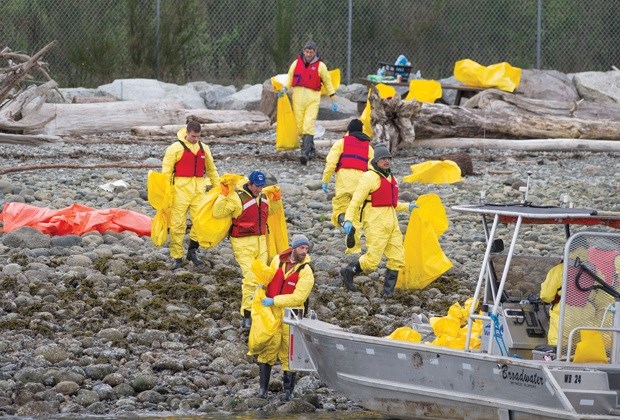Beaches in West Vancouver remained closed this week as cleanup from last week’s oil spill continued.
A cleanup crew from Western Canada Marine Response Corp. worked on several West Vancouver beaches where oil was found over the weekend, including Sandy Cove, Dundarave, Ambleside and an area of shoreline near the Lions Gate Bridge.
The Ministry of Environment has cautioned the municipality it’s possible — although unlikely — more oil could come ashore, said Jeff McDonald, spokesman for the District of West Vancouver.
So far, most of the oil spotted has been “marble-sized” blobs of tar, said McDonald.
Ron Polly said after he learned the oil slick had come ashore in West Vancouver, he went down to the east side of the beach under the Lions Gate Bridge on Saturday to check for water birds in distress.
There, he found “globs of oil on the rocks all over the place going north into the mudflats,” he said. Polly described the tar blobs as “about the size of tennis balls.”
“I found a dead duck that had oil on it,” he said. Polly said there was a flock of water birds swimming close to shore at the time. “Some of them looked like they had signs of oil on them.”
Polly said he’s been involved in helping rescue birds from oil spills in Burrard Inlet in the past. “It’s good to see it get cleaned up,” he said.
But he added, “The spill should never have happened. I don’t think the response was as good as it should have been.”
Polly is not alone in that assessment. Political mop up from the spill also continued this week, after a number of politicians questioned both the time it took to get the spill contained and the delay in notifying neighbouring municipalities.
According to a timeline provided by City of Vancouver Chief Administrative Officer Penny Ballem Tuesday morning, emergency spill response wasn’t activated until three hours after the spill was reported, and a boom was not secured around the Marathassa, a grain ship on her maiden voyage from Korea, until early the next morning — about 12 hours after the spill was reported. That’s also when municipal officials, including the District of West Vancouver, were alerted to the spill.
Michael Lowry, spokesman for the Western Canada Marine Response Corp., defended the timeliness of the response. Lowry said crews couldn’t put a boom around the ship earlier because they didn’t know which vessel was responsible for the spill.
Coast Guard Commissioner Jody Thomas also defended the cleanup efforts this week as excellent.
But Fred Moxey, a North Vancouver resident and retired commander of the now-closed Kitsilano Coast Guard base, said had that station remained open, response to the oil spill could have been much faster.
Had that station been open, it’s likely someone from the public would have notified them and “the crew would jump in a fast response boat,” said Moxey. Because tides and currents quickly disperse oil, making it more difficult to pinpoint the source, “when you have an oil spill it’s vital you get there as quickly as possible,” he said.
Moxey said when he was in charge of the station, a Coast Guard pollution response vessel with 1,000 feet of boom, skimmers and oil recovery tanks was at the ready.
“That vessel probably would have been on the scene in minutes,” he said.
John Weston, MP for West Vancouver, described the response to the spill on Friday as “world class.”
He said the closure of the Kitsilano base had “nothing to do with response at all” adding the base “never had any of the equipment you’d want to deploy in a case like this.”
Mary Polak, B.C. environment minister, voiced concern about the spill response in the legislature this week, saying, “The initial response to this incident was absolutely unacceptable.”
She added, “The response to the English Bay marine spill was not world class — not by any stretch of the imagination.”
On Tuesday, shoreline inspections in West Vancouver were continuing, said Lowry. “The amount (of oil) that showed up on the beaches was extremely small,” he said. “It was not like a giant slick.”
Lowry said crews will be sampling water and sand to make sure it’s safe before beaches will be reopened.



